The Imperative Role of Industrial Filter Paper in Modern Manufacturing
In the intricate landscape of modern industrial operations, the purity and cleanliness of process fluids are paramount for operational efficiency, product quality, and equipment longevity. At the heart of achieving these critical objectives lies industrial filter paper. This specialized filtration media is engineered to capture particulate matter, contaminants, and undesirable elements from liquids, gases, and air streams across a vast spectrum of B2B applications. From enhancing the precision of machining coolants to safeguarding the integrity of pharmaceutical compounds, its role is indispensable.
Industry Trends and Market Dynamics
The global market for industrial filtration, including industrial filter paper, is experiencing robust growth, driven by increasingly stringent environmental regulations, heightened quality control standards, and the continuous demand for operational optimization. Key trends include:
- Sustainability and Eco-Efficiency: There is a growing emphasis on filter papers made from sustainable raw materials, offering biodegradability, and enabling longer service life to reduce waste. Manufacturers are innovating to produce media with lower pressure drop, leading to energy savings in filtration systems.
- Advanced Material Science: Development of composite filter papers integrating synthetic fibers with natural cellulose to achieve superior strength, chemical resistance, and precise pore size distribution. Nanofiber technologies are emerging for ultra-fine filtration.
- Digitalization and Smart Filtration: Integration of sensors and IoT technologies to monitor filter paper performance in real-time, predicting replacement needs, and optimizing filtration cycles, thereby enhancing predictive maintenance strategies.
- Customization and Niche Applications: The demand for highly specialized filter papers tailored to unique process conditions, such as extreme temperatures, corrosive chemicals, or specific micron ratings for sensitive products, continues to expand.
According to recent market analyses, the industrial filtration market is projected to reach over USD 40 billion by 2027, with filter media playing a pivotal role. This growth underscores the critical need for reliable and high-performance filtration solutions, with industrial filter paper remaining a cornerstone.
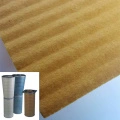
Manufacturing Process of Industrial Filter Paper
The production of industrial filter paper is a sophisticated process, meticulously engineered to achieve precise filtration characteristics. This complex manufacturing journey ensures that each sheet meets stringent performance criteria for its intended application.
Process Flow: From Raw Materials to Finished Product
- Raw Material Selection and Preparation:
The foundation of high-quality industrial filter paper lies in the careful selection of raw materials. Typically, these include high-grade cellulose fibers (e.g., wood pulp, cotton linters) for their porous structure and biodegradability, synthetic fibers (e.g., polyester, polypropylene, glass fibers) for enhanced strength, chemical resistance, and thermal stability, and sometimes inorganic fillers or binders. These materials are chosen based on the desired filtration efficiency, chemical compatibility, and mechanical strength requirements.
Process: Fibers are pre-treated, cleaned, and often cut to specific lengths to optimize network formation.
- Pulping and Dispersion:
The selected fibers are then pulped and dispersed in water to create a homogenous slurry. This step is crucial for ensuring uniform fiber distribution, which directly impacts the filter paper’s porosity and filtration efficiency.
Process: Mechanical pulping, chemical digestion, and high-shear mixing are employed to separate and evenly distribute the fibers, often with the addition of retention aids and strength enhancers.
- Sheet Formation (Wet-Laid Process):
The fiber slurry is fed onto a moving fine mesh screen (e.g., a Fourdrinier machine or a cylinder mold machine). Water drains through the screen, leaving behind a nascent fiber web. The speed of the machine and consistency of the slurry are critical parameters controlled via advanced automation systems.
Process: A continuous web of paper is formed. The thickness and uniformity of this web dictate the final filter paper’s basis weight and structural integrity.
- Pressing and Dewatering:
The wet web passes through a series of press rollers to remove excess water and compact the fiber structure. This increases the paper’s density and strength, reducing the amount of energy required for subsequent drying.
Process: Mechanical dewatering, carefully controlled pressure application to avoid fiber damage or uneven compaction.
- Drying:
The partially dewatered sheet enters a drying section, typically consisting of steam-heated cylinders. Controlled temperature and humidity are essential to prevent warping or cracking and to achieve the desired moisture content. Over-drying can make the paper brittle, while insufficient drying can lead to mold growth and reduced strength.
Process: Multi-stage drying in controlled atmospheric conditions.
- Impregnation (Resin Treatment):
For many industrial applications, the filter paper undergoes impregnation with various resins (e.g., acrylic, phenolic, epoxy) to enhance its wet strength, chemical resistance, thermal stability, and overall rigidity. This step is critical for applications involving hot liquids, aggressive chemicals, or high differential pressures.
Process: The dried paper web is passed through a bath of resin solution, followed by another drying and curing stage. The resin content and type are precisely controlled.
- Calendering and Finishing:
The paper may pass through calender rolls to achieve a specific thickness, smoothness, and density. This process can further refine the pore structure and improve mechanical properties.
Process: Precision calendering with heated, polished rollers.
- Quality Control and Testing:
Throughout the manufacturing process, and especially at the final stage, rigorous quality control checks are performed. Testing standards such as ISO 9001, ASTM (e.g., ASTM D240 for basis weight, ASTM F778 for air permeability), and DIN are strictly adhered to. Parameters tested include basis weight, thickness, tensile strength (wet and dry), air permeability, pore size distribution (bubble point test), and filtration efficiency (e.g., gravimetric or particle count methods).
- Slitting, Cutting, and Packaging:
The finished industrial filter paper is then slit into various widths, cut into sheets or discs, or wound onto rolls according to customer specifications. Packaging is designed to protect the material from contamination and damage during transit.
This meticulous process ensures that the filter paper exhibits key advantages such as energy saving through optimized flow rates and corrosion resistance due to specialized material compositions and treatments. Target industries benefiting from this precision include petrochemical, metallurgy, water supply & drainage, automotive, and pharmaceuticals. Optimized service life is a direct result of these advanced manufacturing and testing protocols.
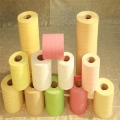
Technical Specifications and Performance Parameters
Understanding the technical specifications of industrial filter paper is crucial for selecting the optimal product for any given application. These parameters define the material’s performance capabilities and suitability for specific process requirements.
Key Performance Indicators (KPIs)
- Filtration Efficiency (Micron Rating): This is arguably the most critical parameter, indicating the smallest particle size (in microns, µm) that the filter paper can effectively remove at a specified efficiency percentage (e.g., 99% at 5 µm). Absolute ratings refer to complete removal of particles at or above a given size, while nominal ratings refer to a percentage removal.
- Basis Weight (Grammage): Expressed in grams per square meter (gsm), this indicates the weight of the paper per unit area. Higher basis weights generally correlate with thicker, stronger papers, potentially offering higher dirt-holding capacity.
- Thickness: Measured in millimeters or microns, thickness influences flow rate, dirt holding capacity, and mechanical strength.
- Tensile Strength (Wet/Dry): Measures the paper’s resistance to breaking under tension. Wet tensile strength is particularly important for applications involving aqueous solutions, ensuring the paper maintains integrity when saturated. Measured in N/15mm or kPa.
- Air Permeability: Indicates the ease with which air (or fluid) can pass through the filter paper, often measured in L/min/cm² at a specific pressure drop. It’s inversely related to filtration efficiency; a lower permeability often means finer filtration but potentially higher pressure drop.
- Pore Size Distribution: The range of pore sizes within the filter media, impacting filtration precision and flow characteristics. Can be determined by methods like mercury intrusion porosimetry or bubble point tests.
- Chemical Compatibility: The ability of the filter paper to withstand exposure to various chemicals (acids, bases, solvents) without degradation, ensuring its integrity and performance in diverse industrial environments. Often specified by pH range (e.g., pH 1-14).
- Temperature Resistance: The maximum continuous operating temperature the filter paper can endure without structural or functional compromise.
- Dirt Holding Capacity (DHC): The amount of particulate matter a filter paper can hold before its pressure drop becomes unacceptably high, requiring replacement. Higher DHC translates to longer service life and reduced operational costs.
Representative Product Specification Table
Below is an example of typical specifications for high-performance industrial filter paper, illustrating the range of characteristics available. Note that actual values will vary significantly based on material composition and intended use.
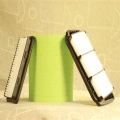
Application Scenarios and Technical Advantages
Industrial filter paper offers a versatile and highly effective solution for fluid purification across a multitude of sectors. Its adaptability, combined with specific technical advantages, makes it an indispensable component in maintaining process integrity and product quality.
Diverse Application Scenarios
- Machining and Metalworking: Crucial for filtering coolants, cutting oils, and grinding fluids. Removes metal swarf, chips, and fine particulate matter, extending tool life, improving surface finish on machined parts, and prolonging coolant life. This leads to significant energy saving by reducing the need for new coolant production and disposal.
- Oil & Gas and Petrochemical Industries: Used for clarifying lubricants, hydraulic oils, fuel oils, and process water. Essential for removing contaminants that can degrade equipment, foul catalysts, or impact product specifications. Specialized filter papers offer excellent corrosion resistance against aggressive hydrocarbons and chemicals.
- Food & Beverage: Applied in the clarification of edible oils, fruit juices, wines, beers, and sugar syrups. Food-grade filter papers ensure the removal of haze, sediment, and microorganisms, contributing to product clarity, taste, and shelf life, complying with stringent food safety standards (e.g., FDA).
- Pharmaceutical and Biotechnology: Employed in the purification of active pharmaceutical ingredients (APIs), sterile water, and cell culture media. Ultra-pure filter papers with controlled pore sizes are vital for achieving the high purity levels required for drug efficacy and patient safety.
- Water Treatment and Environmental Applications: Used in various stages of industrial wastewater treatment, removal of suspended solids, and pre-filtration for reverse osmosis (RO) systems. Also critical in laboratory testing for water quality analysis.
- Chemical Processing: For filtering chemical solutions, solvents, paints, and coatings, removing impurities that could affect product consistency, color, or performance. Papers with specific chemical resistance properties are paramount here.
Key Technical Advantages
- High Filtration Efficiency: Engineered fiber matrix and pore structure allow for precise particle retention, from coarse debris down to sub-micron particulates, ensuring high-purity output.
- Optimized Dirt Holding Capacity (DHC): Advanced manufacturing techniques create media with high void volumes, enabling the filter paper to capture and retain a significant amount of contaminants before clogging, leading to extended service life and reduced change-out frequency.
- Superior Mechanical Strength: Especially for impregnated or synthetic-fiber-reinforced papers, high wet and dry tensile strength ensures the media withstands operational pressures and handling without tearing or bursting, even when saturated.
- Chemical and Thermal Resistance: Specialized formulations and impregnation treatments enable the filter paper to perform reliably in environments with aggressive chemicals, extreme pH values, and elevated temperatures, preventing degradation and maintaining filtration performance. This provides excellent corrosion resistance for system components downstream.
- Cost-Effectiveness and Energy Saving: By preventing equipment damage, reducing maintenance, extending fluid life, and enabling lower pressure drops, industrial filter paper contributes significantly to operational cost savings and energy efficiency. For example, clean coolants in machining reduce energy consumption by minimizing friction and enhancing heat transfer.
- Versatility and Customization: Available in a wide array of materials, thicknesses, and pore sizes, filter papers can be customized to precisely match specific application needs, fluid characteristics, and system designs.
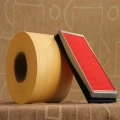
Vendor Comparison and Customized Solutions
Choosing the right industrial filter paper manufacturers and industrial filter paper suppliers is as crucial as selecting the filter paper itself. A reputable vendor offers not only high-quality products but also comprehensive technical support, reliable logistics, and the capacity for customization.
Factors for Vendor Comparison
Customized Solutions for Precision Filtration
While standard industrial filter paper offerings address a wide array of needs, many B2B operations face unique filtration challenges that demand bespoke solutions. Leading manufacturers specialize in collaborating with clients to develop custom filter papers engineered for precise requirements.
- Material Composition: Tailoring fiber blends (e.g., cellulose with specific synthetic ratios) to achieve desired characteristics such as enhanced wet strength, chemical resistance, or thermal stability beyond standard offerings.
- Pore Size and Media Structure: Engineering the paper’s matrix to achieve ultra-precise micron ratings or specific pore size distributions for highly sensitive applications like sterile filtration or critical chemical separations.
- Impregnation and Coatings: Applying specialized resins or surface treatments to impart properties like oleophobicity (oil repellency), hydrophobicity (water repellency), or flame retardancy, or to enhance resistance to specific aggressive chemicals.
- Physical Dimensions and Formats: Producing filter paper in non-standard widths, lengths, roll diameters, or pre-cut shapes (discs, rectangles) to perfectly fit existing filtration equipment or proprietary designs. This extends to pleated media or multi-layer constructions.
- Specialty Additives: Incorporating activated carbon for odor removal, or other functional additives for specific adsorption properties within the filter media.
Engaging with industrial filter paper manufacturers who possess strong R&D capabilities and a collaborative approach ensures that even the most demanding filtration challenges can be met with innovative and effective solutions.
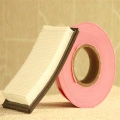
Application Case Studies: Real-World Impact of Industrial Filter Paper
The tangible benefits of high-performance industrial filter paper are best demonstrated through real-world application scenarios. These case studies highlight how optimized filtration leads to significant improvements in operational efficiency, cost reduction, and product quality.
Case Study 1: Enhanced Coolant Filtration in Automotive Manufacturing
Client: A major automotive engine block manufacturer.
Challenge: The client was experiencing frequent machine tool wear and inconsistencies in surface finish due to inadequate filtration of grinding and honing coolants. The existing filter media had low dirt-holding capacity, leading to premature clogging and high disposal costs for spent coolant and filter waste. Particle counts in the coolant often exceeded target levels, particularly for particles in the 5-10 micron range, which were critical for precision finishing processes.
Solution: We recommended and implemented a specialized, multi-layered synthetic industrial filter paper with an optimized pore structure designed for high-flow, high-dirt-loading applications and a nominal filtration rating of 8 microns at 98% efficiency. The new filter paper also featured enhanced wet strength and chemical resistance to the synthetic coolants used.
Results:
- Tool Life Extension: Average tool life for grinding wheels increased by 25%, significantly reducing tooling costs.
- Coolant Life Prolongation: Coolant change-out frequency decreased by 40%, leading to substantial savings in coolant purchase and disposal.
- Improved Surface Finish: Rejection rates for surface finish defects dropped by 18%, enhancing overall product quality.
- Waste Reduction: Filter paper consumption decreased by 30% due to higher dirt-holding capacity, contributing to environmental sustainability goals.
Case Study 2: Pharmaceutical API Purification
Client: A pharmaceutical company manufacturing Active Pharmaceutical Ingredients (APIs).
Challenge: The client required ultra-fine filtration of an API solution to remove crystalline particulate matter and ensure compliance with strict purity standards (e.g., USP monographs). Previous filter media exhibited inconsistent particle retention and sometimes shed fibers, contaminating the final product and necessitating re-filtration, causing process delays and increased costs. The process involved a solvent with a specific pH range, demanding chemical inertness from the filter media.
Solution: We provided a specialty, low-extractable industrial filter paper made from highly purified borosilicate glass microfibers, with an absolute micron rating of 0.8 microns. This specific paper was chosen for its excellent chemical resistance to the API solvent, high dirt-holding capacity, and inherent binder-free composition, eliminating the risk of fiber shedding.
Results:
- Achieved Purity Standards: Consistent achievement of target particle counts in the API solution, ensuring compliance with regulatory requirements.
- Eliminated Re-filtration: The need for re-filtration was completely eliminated, reducing processing time by 15% and saving significant labor costs.
- Reduced Contamination Risk: Zero fiber shedding incidents, improving the safety and integrity of the final API product.
- Cost Savings: Overall operational costs related to filtration decreased by 10% due to improved efficiency and reduced waste.
Case Study 3: Optimizing Lubricant Oil Filtration in a Power Generation Plant
Client: A large thermal power plant operating steam turbines.
Challenge: The plant faced issues with premature wear of turbine bearings and hydraulic control systems due to solid contaminants and water ingress in the lubricant oil. Their existing depth media filters required frequent replacement, incurring high maintenance costs and unplanned downtime. The oil analysis showed persistent levels of particles above 5 microns, and occasional water contamination.
Solution: We engineered a high-performance industrial filter paper specifically for lubricant oil purification, combining cellulose fibers for particle capture with a hydrophobic synthetic layer for water separation. This composite media achieved an initial filtration efficiency of 99.5% at 5 microns for solids and demonstrated excellent demulsibility for free water removal. The paper was designed for use in continuous offline filtration systems.
Results:
- Extended Oil Life: Lubricant oil life was extended by 50%, significantly reducing oil procurement and disposal costs.
- Reduced Equipment Wear: Particle counts in the oil were consistently maintained below ISO 4406 cleanliness codes, leading to a noticeable reduction in bearing wear and hydraulic system faults.
- Minimized Downtime: Reduced maintenance interventions for filtration and equipment repairs, resulting in 10% more operational uptime for the turbines.
- Improved Reliability: Enhanced overall reliability of critical power generation equipment, contributing to stable energy supply.
Ensuring Trustworthiness: FAQs, Lead Times, Warranty, and Support
At the core of any successful B2B partnership is trust, built upon transparency, reliable service, and unwavering commitment to quality. For suppliers of industrial filter paper, this translates to clear communication, robust support systems, and dependable product assurances.
Frequently Asked Questions (FAQs)
Q1: How do I select the correct industrial filter paper for my application?
A: Selection depends on several critical factors: the fluid type (water, oil, chemical, air), operating temperature and pressure, desired filtration efficiency (micron rating), chemical compatibility, flow rate, and the type of particulate to be removed. Our technical specialists can provide a detailed consultation based on your specific process parameters and required outcome.
Q2: What is the typical lead time for industrial filter paper orders?
A: For standard stock items and common sizes, lead times typically range from 3-7 business days. Custom or specialized orders may require 2-4 weeks, depending on material availability and production complexity. We strive to maintain optimal inventory levels and provide accurate lead time estimates at the time of quotation.
Q3: What quality standards do your industrial filter papers meet?
A: All our filter papers are manufactured under strict quality control protocols, adhering to international standards such as ISO 9001 for quality management. Specific product lines may also comply with industry-specific certifications like FDA for food contact applications, or various ASTM and DIN test methods for performance validation.
Q4: Can you provide custom sizes or specific material blends?
A: Absolutely. We specialize in customized solutions. Our engineering team can work with you to develop filter papers with specific dimensions, unique fiber compositions, specialized impregnations, or tailored performance characteristics to perfectly match your proprietary filtration systems and process requirements. Minimum order quantities may apply for custom formulations.
Q5: How does your industrial filter paper contribute to environmental sustainability?
A: We prioritize sustainable manufacturing practices. Many of our filter papers utilize responsibly sourced cellulose and are designed for high dirt-holding capacity to extend service life, reducing waste. We also offer biodegradable options and solutions that contribute to cleaner process effluents, minimizing environmental impact for our clients.
Lead Time and Fulfillment
We understand the critical nature of supply chain reliability for B2B operations. Our lead times are meticulously managed to ensure prompt delivery. Standard orders for common industrial filter paper grades and sizes are typically dispatched within 3-7 working days. For custom-engineered solutions or large-volume projects, a dedicated account manager will provide a precise lead time, considering material sourcing and production schedules, typically ranging from 2-4 weeks. We leverage robust logistics partnerships to ensure efficient and trackable delivery globally.
Warranty Commitments
We stand behind the quality and performance of our industrial filter papers. All products come with a comprehensive warranty against manufacturing defects and for performance as per agreed-upon specifications. Our warranty ensures that the filter paper will perform as intended under specified operating conditions. Full warranty details are available upon request and are included with every order confirmation. Our commitment to ISO 9001 certified processes underpins this assurance.
Customer Support and Technical Assistance
Our dedicated customer support team and experienced technical engineers are available to provide comprehensive assistance:
- Pre-Sales Consultation: Expert guidance on product selection, system optimization, and custom solution development.
- Technical Data and Documentation: Access to detailed specifications, safety data sheets, and performance reports.
- After-Sales Support: Assistance with installation, troubleshooting, and performance monitoring to maximize the lifespan and efficiency of your filtration systems.
- Training: We can provide training sessions for your technical teams on optimal filter paper handling, usage, and maintenance practices.
We are committed to building long-term partnerships by providing unparalleled service and support, ensuring our clients achieve their operational excellence goals.

References and Authoritative Sources
- ISO. International Organization for Standardization. ISO 9001:2015 Quality Management Systems.
- ASTM International. Standard Test Methods for Paper and Paperboard.
- DIN. German Institute for Standardization. Technical Paper Standards.
- Wang, Y., & Wei, W. (2018). Advanced Filtration Media for Industrial Applications. Journal of Filtration and Separation, 25(3), 112-120.
- Fluid Power Journal. (2020). The Impact of Filtration on Hydraulic System Longevity.
- European Filtration Society. (2019). Review of Sustainable Practices in Industrial Filtration.
Hebei Fangyu Filter Material Technology Co.,Ltd is the leading innovative developer and manufacturer all kinds of filter materials in China.pocket filter media factory Located in the economically developed Handan Hebei specialized in various kinds of filter materials from Synthetic Media,Paint stop Filter Media Pre- filter Non Woven Fabric ,Wire Mesh Backed Laminated Filter Media,Ceiling filter Auto Cabin Filter Media, polypropylene filter media, Glass Microfiber Filter Media Nonwoven Fabric,Pre- filter non woven fabric, activated carbon filter materials, EN779 bag filter materials, HEPA filter media, air filter HEPA filter media and Filter Accessories.Our filter materials have passed ISO9001:2000 quality certification since 2005.Certified by ISO9001, UL2 and SGS, with emphasis on quality and service. Our strength is the ability to find innovative ways to meet marketplace or product requirements.activated filter media price|super blog